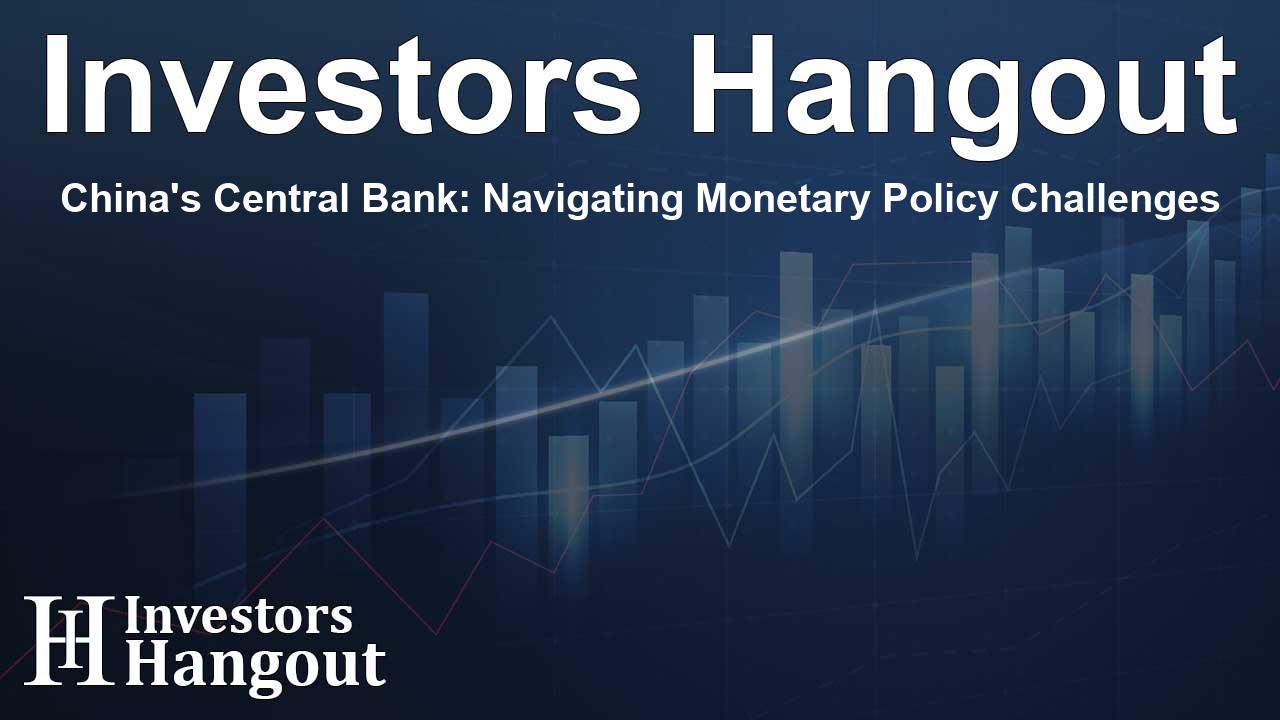China's Central Bank: Navigating Monetary Policy Challenges

China's Central Bank Adjusts Monetary Strategies
As the global economy evolves, China's central bank, known as the People’s Bank of China (PBOC), is gearing up to deploy significant monetary tactics, reaching levels not seen in the past decade. This shift is aimed at stimulating the economy while managing the effects of external pressures such as tariff hikes. However, this aggressive approach may quickly exhaust the PBOC’s available resources.
Challenges Facing Monetary Policy
The recent decision by the PBOC to halt treasury bond purchases signals the constraints it faces in today's complex economic landscape. The scarcity of available assets highlights the pressing need for effective resource management amidst these challenges.
Economic Environment and Policy Limitations
Analysts point to several interrelated factors that complicate policy implementation. Chief among them are concerns over potential capital outflows, weak domestic credit demand, and limited capacity for aggressive interest rate cuts or liquidity injections. Such factors mean that any further easing might lead to depreciation of the yuan, diverting funds away from domestic growth needs.
Forward-Looking Remarks from PBOC Leadership
PBOC Governor Pan Gongsheng recently hinted at the possibility of future cuts to the reserve requirement ratio (RRR) if market conditions allow. Despite these signals of a looser monetary policy stance, a formal cut has yet to materialize, indicating a cautious approach moving forward.
Internal Conflicts and Financial Stability
As the PBOC navigates its monetary policy, it must balance various conflicting demands, particularly between short-term stimulating measures and long-term financial stability. Increased monetary easing might provide temporary relief but risks inflating asset bubbles that could threaten economic stability.
The central bank has repeatedly issued warnings about the bond rally pushing yields to historical lows. Such conditions could pose risks when markets inevitably adjust, illustrating the delicate balance the PBOC must manage.
Shifting Monetary Policy Stances
In December, facing persistent deflationary pressures and sluggish growth, the top leadership in China shifted from a long-standing 'prudent' monetary policy to a 'moderately loose' stance. However, the potential space for further rate drops is noticeably contracted compared to previous years, implying the PBOC may need to tread carefully moving forward.
Potential Outcomes of Rate Cuts
Looking ahead, the PBOC's seven-day reverse repo rate, which serves as its new benchmark, currently stands at 1.5%. This figure represents a cumulative reduction of 30 basis points so far this year, marking a significant decrease since the early 2010s. Economic experts, including Larry Hu from Macquarie, predict further cuts may occur, possibly totalling 40 basis points, yet caution that such reductions may not translate into significant changes in lending or credit demand.
Banking Sector Challenges
Confidence among businesses remains low, and consumer sentiment is staggering, averaging at record lows. The shrinking net interest margins at banks, which stand at an all-time low of 1.53%, further complicate the ability to stimulate lending effectively.
Future Projections and Market Reactions
Despite the cautious environment, many analysts forecast an RRR cut in the near future, predicting a potential cumulative reduction of up to 100 basis points throughout the coming years. This adjustment would edge the average RRR closer to the 5% threshold, currently reserved for the smallest banks.
However, falling interest rates could stall the PBOC's overarching goal of transitioning from quantity-based credit expansions to a system where interest rates guide policy more effectively. Balancing these monetary measures is crucial to avoid destabilizing financial markets.
The Balance Between Growth and Stability
While some market observers believe a weaker yuan could enhance export competitiveness amidst tariff threats, this view is countered by those warning against compromising monetary policy for exchange rate steadiness. Excessive currency devaluation could instigate market panic or affect overall economic expectations.
Frequently Asked Questions
What monetary strategies is the PBOC considering?
The PBOC is contemplating aggressive monetary tactics, including potential rate cuts and adjustments to the reserve requirement ratio to stimulate the economy.
Why did the PBOC suspend treasury bond purchases?
The suspension highlights resource limitations and presents a challenge for implementing effective monetary policy in an increasingly complex economic environment.
What are the risks associated with further monetary easing?
Further easing could lead to asset bubbles and financial instability, especially if it insufficiently addresses underlying demand for credit.
How will rate cuts impact banks in China?
Rate cuts could diminish banks' profitability and lead to increased capital outflow risks, complicating the economic landscape further.
What does the future hold for China’s monetary policy?
Experts predict continued adjustments in monetary policy, with a focus on balancing growth stimulation while maintaining financial stability in the face of external pressures.
About The Author
Contact Caleb Price privately here. Or send an email with ATTN: Caleb Price as the subject to contact@investorshangout.com.
About Investors Hangout
Investors Hangout is a leading online stock forum for financial discussion and learning, offering a wide range of free tools and resources. It draws in traders of all levels, who exchange market knowledge, investigate trading tactics, and keep an eye on industry developments in real time. Featuring financial articles, stock message boards, quotes, charts, company profiles, and live news updates. Through cooperative learning and a wealth of informational resources, it helps users from novices creating their first portfolios to experts honing their techniques. Join Investors Hangout today: https://investorshangout.com/
The content of this article is based on factual, publicly available information and does not represent legal, financial, or investment advice. Investors Hangout does not offer financial advice, and the author is not a licensed financial advisor. Consult a qualified advisor before making any financial or investment decisions based on this article. This article should not be considered advice to purchase, sell, or hold any securities or other investments. If any of the material provided here is inaccurate, please contact us for corrections.
